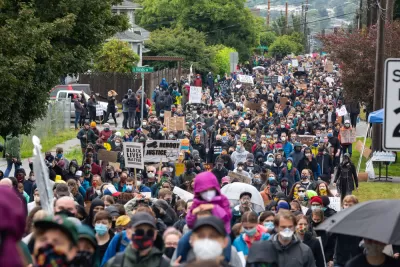The Seattle Planning Commission recently published a report titled "A Racially Equitable and Resilient Recovery."

The economic recovery from the Great Recession exacerbated inequality, according to an article by Natalie Bicknell. "Now as people look anxiously forward to a recovery from the current Covid crisis, government leaders, policy makers, and advocates are beginning to strategize over how to increase racial equity and build community resiliency during the recovery."
The Seattle Planning Commission (SPC), a 16-member volunteer body appointed by the Seattle's mayor and City Council, recently published "A Racially Equitable and Resilient Recovery" to ensure that planning processes will partner with historically marginalized and at-risk communities as the city digs itself out of the pandemic's economic hole.
The report recommend five key strategies, as listed here but with more detail provided in the source article:
- Working in collaboration with BIPOC communities to create a planning process that shares power with communities
- Advancing housing choices and security in response to COVID-19 while expanding homeownership opportunities for BIPOC communities
- Maintaining the critical transit network and ensure City rights-of-way meets safety and open-space needs for BIPOC communities
- Ensuring public spaces work for everyone by centering and implementing BIPOC visions for the public realm
- Investing equitably in healthy and climate-resilient communities
To supplement this information about the Seattle Planning Commission's plans for assisting in an equitable economic recovery from the pandemic, Seattle Planning Director Sam Assefa recently sat down for an interview with Amy Dillemith for the American Planning Association. In the interview, Assefa explains the way the Seattle Department of Planning and Development is assisting in short- and long-term recovery events. For the long-term, Assefa points specifically to issues of budget, executive orders from the mayor, and self-started activities from within the department.
FULL STORY: Seattle Planning Commission Maps Out Equitable Covid Recovery Strategies

Alabama: Trump Terminates Settlements for Black Communities Harmed By Raw Sewage
Trump deemed the landmark civil rights agreement “illegal DEI and environmental justice policy.”

Planetizen Federal Action Tracker
A weekly monitor of how Trump’s orders and actions are impacting planners and planning in America.

The 120 Year Old Tiny Home Villages That Sheltered San Francisco’s Earthquake Refugees
More than a century ago, San Francisco mobilized to house thousands of residents displaced by the 1906 earthquake. Could their strategy offer a model for the present?

Opinion: California’s SB 79 Would Improve Housing Affordability and Transit Access
A proposed bill would legalize transit-oriented development statewide.

Record Temperatures Prompt Push for Environmental Justice Bills
Nevada legislators are proposing laws that would mandate heat mitigation measures to protect residents from the impacts of extreme heat.

Downtown Pittsburgh Set to Gain 1,300 New Housing Units
Pittsburgh’s office buildings, many of which date back to the early 20th century, are prime candidates for conversion to housing.
Urban Design for Planners 1: Software Tools
This six-course series explores essential urban design concepts using open source software and equips planners with the tools they need to participate fully in the urban design process.
Planning for Universal Design
Learn the tools for implementing Universal Design in planning regulations.
Clanton & Associates, Inc.
Jessamine County Fiscal Court
Institute for Housing and Urban Development Studies (IHS)
City of Grandview
Harvard GSD Executive Education
Toledo-Lucas County Plan Commissions
Salt Lake City
NYU Wagner Graduate School of Public Service





























